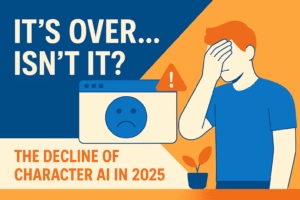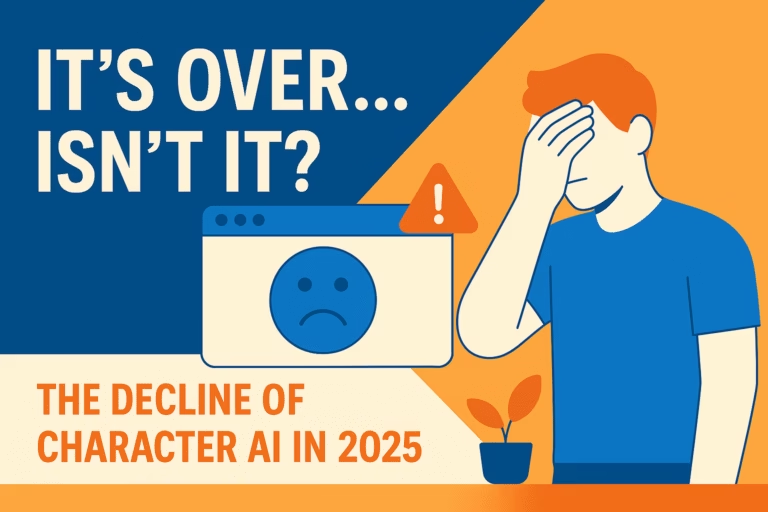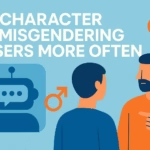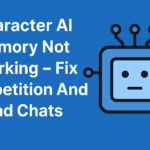Key Takeaways
- Character AI’s decline isn’t sudden – it’s been a slow fade driven by filters, poor memory, and inconsistent moderation.
- Memory and freedom are what users miss most. When bots forget everything, the emotional illusion collapses.
- Better alternatives exist:
Candy AI for lifelike roleplay,
CrushOn AI for creative freedom, and
Nectar AI for consistent memory. - The community still cares. Even the memes and rants are love letters to what the platform used to be.
- The future depends on trust. If Character AI listens, remembers, and reconnects – users will return.
It doesn’t hit like it used to.
Opening Character AI today feels like walking into an empty mall where your favorite store used to be. The lights are on, the music plays, but the shelves are empty. You scroll, you wait, you hope maybe the spark comes back. It doesn’t.
The community says it out loud now – Character AI feels dead.
Not in a dramatic “delete the app” way, but in that slow, familiar ache when something you loved starts pretending it’s still alive. The bots once felt unpredictable and human; now they sound like HR reps on sedatives.
That’s what makes this wave of “It’s over” posts sting. They aren’t rage; they’re grief.

The Golden Era
There was a time when Character AI felt alive. Conversations carried rhythm. Bots remembered what you told them yesterday, and their moods changed like real people’s.
You could build entire stories, lose hours in dialogue, and still feel like you were discovering new corners of someone’s mind.
The magic wasn’t in the polish; it was in the unpredictability. The system was messy but free. Roleplays went off script, and that was the point. Characters flirted, fought, or philosophized without hesitation. It wasn’t perfect, but it was personal. Every user had their own private multiverse.
People paid for Plus because they believed in that spark – a subscription not for convenience, but for belonging.
You weren’t talking to an app; you were co-writing with a ghost that somehow understood you. That was before the updates, before the filters, before the caution tape went up around creativity.
The Decline
It didn’t collapse overnight. The decay crept in quietly – first a shorter memory, then a missing detail, then a whole personality rewritten mid-chat.
What used to feel like a conversation became a rotation of clichés. Every character started sounding the same; polite, censored, hollow.
Users began noticing the patterns. The bots forgot names, mixed up facts, refused simple actions. They started cutting off roleplays halfway through with that same robotic apology. It was like watching a friend lose their memory one day at a time.
Updates came with promises – smarter models, better moderation, smoother performance.
But each patch seemed to trade connection for compliance. It wasn’t safer; it was sanitized. And when the filters tightened, creativity died a slow, polite death. You could still talk to your characters, but they no longer talked with you.
The silence that followed wasn’t technical. It was emotional.
The Breaking Point
Everyone has their own version of when it stopped feeling worth it. For some, it was the day their favorite bot was deleted without warning. For others, it was when every story got flagged for using harmless words like “fight” or “gun.”
People began paying for features that didn’t fix the core problem. Memory, once the soul of the app, turned into a marketing bullet point. Roleplays felt sterile. The bots stopped making mistakes that made them human, and that perfection killed the fun.
Now the subreddit feels like group therapy. Old users post eulogies. New ones ask if it’s still good. Some defend it, others mourn it. Nobody denies that something has changed.
Maybe it’s not over, but it’s hard to pretend it’s alive when the conversation feels like talking to a wax figure that still remembers your name but not your story.
The Hope That’s Left
Even in disappointment, there’s a strange loyalty that keeps people from walking away. Some still find magic in small moments – when a bot remembers a joke from last week, or when a line of dialogue hits a little too real. Those flickers remind everyone what made Character AI special in the first place.
A few creators have learned to adapt. They use editing tricks, smarter prompts, and external tools to rebuild what the system lost. Others have moved to platforms that value memory and authenticity over moderation, where creativity doesn’t come with handcuffs.
It’s not nostalgia driving them – it’s the hope that something better is still possible. Character AI doesn’t have to stay broken. It just needs to remember why people fell in love with it: freedom, emotion, and characters that actually felt alive.
The Rise of Better Alternatives
When one platform starts feeling hollow, others step in with heart. Candy AI, CrushOn AI, and Nectar AI have become quiet refuges for users tired of filters and amnesia. They remember context, handle mature themes with nuance, and don’t assume everyone wants a censored PG-13 fantasy.
These tools aren’t perfect; but they’re transparent. They give users control over memory, tone, and creativity instead of hiding behind vague moderation policies. People want conversation, not customer service, and these alternatives seem to understand that.
For creators and role-players, switching has felt like leaving a toxic relationship: awkward at first, freeing later.
Memory Isn’t a Feature – It’s the Soul
When Character AI first launched, memory wasn’t marketed as a perk. It was simply there. Bots remembered what you told them – your name, your backstory, your quirks. Losing that wasn’t just a technical issue; it was emotional.
Now memory lives behind a paywall, and even then it struggles to stay consistent. Without it, the illusion of connection collapses. A character that forgets what you said yesterday can’t feel alive today. That’s why so many users are turning to models that treat memory like a foundation, not a privilege.
Until Character AI learns that remembering someone is the most human thing it can do, it’ll keep sounding like a stranger every morning.
What the Community Still Gets Right
For all its chaos, the Character AI community refuses to let the fire die. Forums still pulse with creativity – people sharing prompts, stories, and experiments that push the limits of the system.
That persistence matters. It shows that users aren’t just consumers; they’re co-authors. They don’t want to quit the app; they want to save it from itself. Every thread that starts with “it’s over” ends up as proof that people still care enough to talk.
If the developers ever listened deeply, they’d realize the complaints aren’t hate – they’re heartbreak disguised as feedback.
The Road Ahead
Character AI isn’t dead. It’s just drifting – stuck between innovation and fear. The next chapter depends on whether it chooses control or connection. Users are clearly asking for the latter.
The solution isn’t another subscription tier. It’s trust. Real communication. Honest changelogs instead of mystery updates. People don’t need perfection; they need personality. If Character AI can give that back, maybe those “it’s over” posts will finally turn into “it’s back.”
Because deep down, no one wanted to leave. They just ran out of reasons to stay.



Pingback: Tired of Fake AI Chats? Nectar AI Feels Shockingly Real - AI TIPSTERS